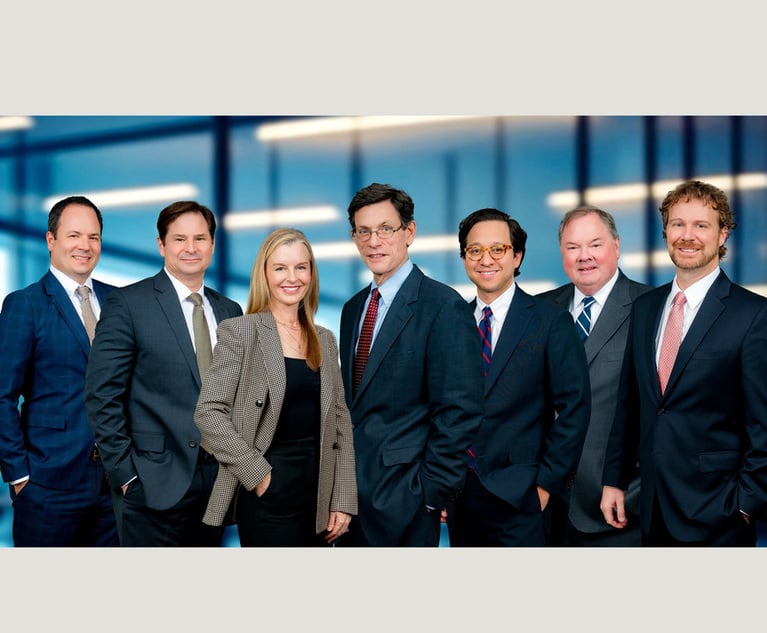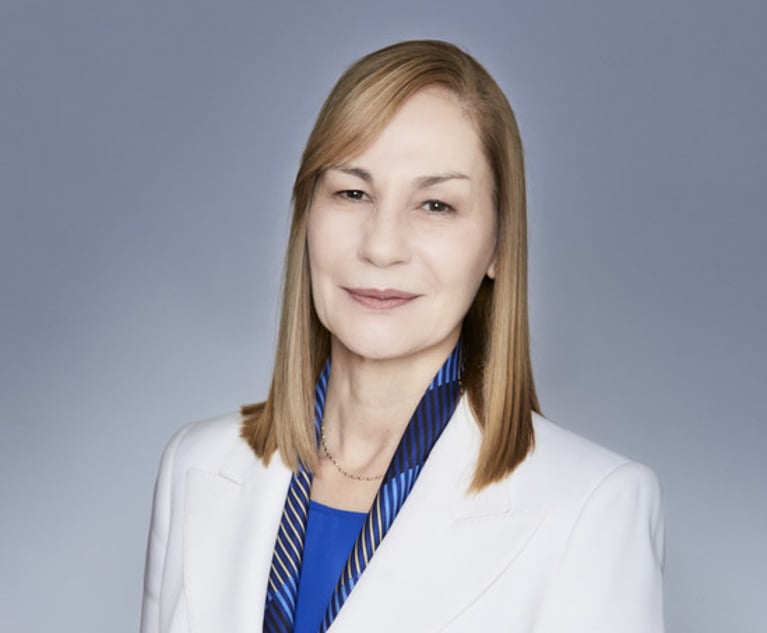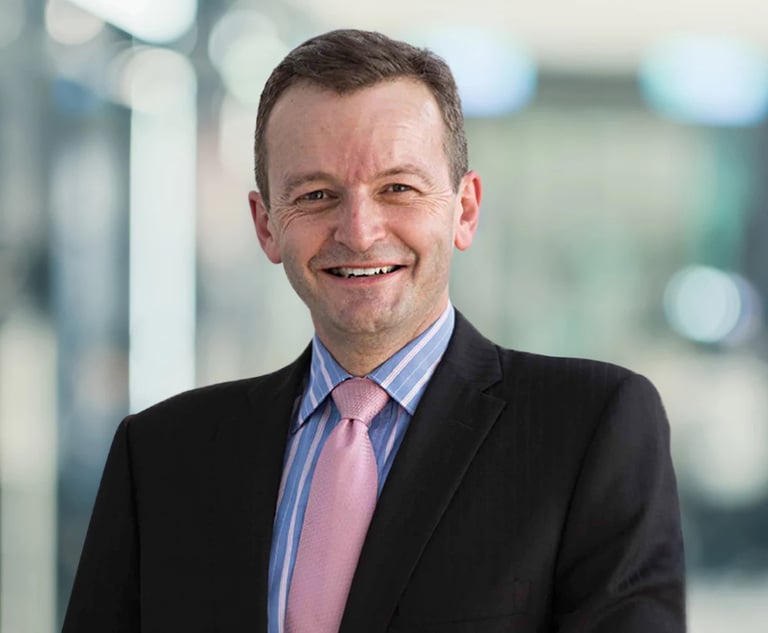Why Some Law Firms Are Actually Adding Office Space: The Morning Minute
The news and analysis you need to start your day.
October 15, 2021 at 06:00 AM
5 minute read

Want to get this daily news briefing by email? Here's the sign-up.
WHAT WE'RE WATCHING
COST VS. CULTURE - It's true that plenty of firms have reduced their physical footprints as more lawyers have shifted to remote work over the past 19 months, but the office appears to be far from obsolete. As Law.com's Dylan Jackson reports, a number of firms are reaffirming their commitment to their office space and, in some cases, even expanding. Fried Frank, for example, has recommitted to its 400,000-square-foot Manhattan office at 1 New York Plaza. Greenberg Traurig gave up a floor in its new four-story office in One Vanderbilt in New York, but also announced that it is expanding its Westchester County office and plans to open "one or two" more offices in Long Island. Others firms, such as Lowenstein Sandler, are even adding more space, expanding their dining, fitness and concierge amenities in an effort to transform the office into a "destination" for attorneys and staff. While shedding square footage may do wonders for a firm's rent bill, '[t]he cost-savings are not free," said Jeffrey Welch, executive vice president of the CBRE Group. "There will be cultural impacts when you [reduce space]. If you're less connected to your firms and colleagues, you'll be more at risk to lateral movement to other firms."
OUT OF THE BOX - The pandemic has made trying to predict literally anything a fool's errand. So it makes sense that juror behavior would now be completely off the wall. As Law.com's Alaina Lancaster writes in this week's Law.com Barometer newsletter, a confluence of COVID-related factors are causing more erratic verdicts. Some jury consultants and litigators say the exclusion of unvaccinated individuals from juries and an uptick in prospective juror hardships (along with more sympathetic judges) are leading to less representative jury panels. Meanwhile, as Lancaster writes, "the jurors who do make it in the box, or more likely spread about the courtroom, might be even more polarized than they were before the pandemic. Based on preliminary data, pandemic-era jury makeup and attitudes could lead to more defense verdicts or hung juries, but it could also mean jurors are having more extreme responses to cases involving science." The upshot of all this unpredictability could end up being more settlements. "That's one of the good pressures here," said Harvey Moore, a Florida-based trial consultant. "Ultimately, because we're resuming trials, there is more pressure on both sides to be reasonable in their settlements." To receive the Law.com Barometer directly to your inbox each week, click here.
TESTING THEIR PATIENTS - Kilpatrick Townsend & Stockton and Robins Kaplan filed a lawsuit Thursday in Washington Western District Court on behalf of Premera Blue Cross. The complaint accuses Omaha, Nebraska-based GS Labs of scheming against patients and insurers to increase its profits by convincing patients that they need to take all three COVID-19 tests that GS Labs offers. The suit also claims that GS Labs misrepresented its "cash prices" to maximize insurance reimbursement. Counsel have not yet appeared for the defendant. The case is 2:21-cv-01399, Premera Blue Cross v. GS Labs, LLC. Stay up on the latest deals and litigation with the new Law.com Radar.
EDITOR'S PICKS
- Bankruptcy Trustee Says Girardi Keese's Lenders May Have Known About Fraud By Amanda Bronstad
- Law.com Readers' Poll: Are You Happy With Hybrid? By Law.com Contributing Editors
WHILE YOU WERE SLEEPING
RETURN ON INVESTMENT - It pays to get in on the ground floor. As Law.com International's Jennigay Coetzer reports, the African tech start-up boom is boosting business for law firms. According to the World Economic Forum, the number of African tech-startups receiving financial backing grew nearly six times faster than the global average between 2015 and 2020. This year, by August, over 300 African tech start-ups had raised more than $1.1 billion, combined, and this is the first time the sector has broken the $1 billion mark, according to Disrupt Africa. That's good news for attorneys like Dayo Okusami, a partner at Templars in Lagos, Nigeria, who said the tech boom has led to a whole new gamut of significant work. For example, one of the largest fintech companies in Nigeria is tech start-up digital bank Kuda Bank. Templars has advised the company for three years and has witnessed it grow. "We've been their lawyers for three years and the founder will tell you: 'When I met Dayo, I couldn't afford to pay him'." But Templars invested in the bank and helped them to get going. "I told him, 'when you get big you pay me the big bucks'," said Okusami.
WHAT YOU SAID
"Get comfortable with tooting your own horn and openly celebrating your successes—however unnatural it may feel. If you wait around for people of influence to notice your worth, you may very well miss out on choice opportunities."
This content has been archived. It is available through our partners, LexisNexis® and Bloomberg Law.
To view this content, please continue to their sites.
Not a Lexis Subscriber?
Subscribe Now
Not a Bloomberg Law Subscriber?
Subscribe Now
NOT FOR REPRINT
© 2025 ALM Global, LLC, All Rights Reserved. Request academic re-use from www.copyright.com. All other uses, submit a request to [email protected]. For more information visit Asset & Logo Licensing.
You Might Like
View All

New Law Firm Broadfield Hires Sidley Trio and Launches in Hong Kong with Local Alliance


‘The US Market Is Critical’: KPMG’s Former Head of Global Legal Services On the Big Four Firm’s Legal Arm Entering the US
6 minute readLaw Firms Mentioned
Trending Stories
- 1Ex-Starbucks GC Exiting Latest Role, Will Get Severance
- 2Family Law Special Section 2025
- 3We Must Uphold the Rights of Immigrant Students
- 4Orrick Picks Up 13-Lawyer Tech, VC Group From Gunderson Dettmer
- 5How Alzheimer’s and Other Cognitive Diseases Affect Guardianship, POAs and Estate Planning
Who Got The Work
J. Brugh Lower of Gibbons has entered an appearance for industrial equipment supplier Devco Corporation in a pending trademark infringement lawsuit. The suit, accusing the defendant of selling knock-off Graco products, was filed Dec. 18 in New Jersey District Court by Rivkin Radler on behalf of Graco Inc. and Graco Minnesota. The case, assigned to U.S. District Judge Zahid N. Quraishi, is 3:24-cv-11294, Graco Inc. et al v. Devco Corporation.
Who Got The Work
Rebecca Maller-Stein and Kent A. Yalowitz of Arnold & Porter Kaye Scholer have entered their appearances for Hanaco Venture Capital and its executives, Lior Prosor and David Frankel, in a pending securities lawsuit. The action, filed on Dec. 24 in New York Southern District Court by Zell, Aron & Co. on behalf of Goldeneye Advisors, accuses the defendants of negligently and fraudulently managing the plaintiff's $1 million investment. The case, assigned to U.S. District Judge Vernon S. Broderick, is 1:24-cv-09918, Goldeneye Advisors, LLC v. Hanaco Venture Capital, Ltd. et al.
Who Got The Work
Attorneys from A&O Shearman has stepped in as defense counsel for Toronto-Dominion Bank and other defendants in a pending securities class action. The suit, filed Dec. 11 in New York Southern District Court by Bleichmar Fonti & Auld, accuses the defendants of concealing the bank's 'pervasive' deficiencies in regards to its compliance with the Bank Secrecy Act and the quality of its anti-money laundering controls. The case, assigned to U.S. District Judge Arun Subramanian, is 1:24-cv-09445, Gonzalez v. The Toronto-Dominion Bank et al.
Who Got The Work
Crown Castle International, a Pennsylvania company providing shared communications infrastructure, has turned to Luke D. Wolf of Gordon Rees Scully Mansukhani to fend off a pending breach-of-contract lawsuit. The court action, filed Nov. 25 in Michigan Eastern District Court by Hooper Hathaway PC on behalf of The Town Residences LLC, accuses Crown Castle of failing to transfer approximately $30,000 in utility payments from T-Mobile in breach of a roof-top lease and assignment agreement. The case, assigned to U.S. District Judge Susan K. Declercq, is 2:24-cv-13131, The Town Residences LLC v. T-Mobile US, Inc. et al.
Who Got The Work
Wilfred P. Coronato and Daniel M. Schwartz of McCarter & English have stepped in as defense counsel to Electrolux Home Products Inc. in a pending product liability lawsuit. The court action, filed Nov. 26 in New York Eastern District Court by Poulos Lopiccolo PC and Nagel Rice LLP on behalf of David Stern, alleges that the defendant's refrigerators’ drawers and shelving repeatedly break and fall apart within months after purchase. The case, assigned to U.S. District Judge Joan M. Azrack, is 2:24-cv-08204, Stern v. Electrolux Home Products, Inc.
Featured Firms
Law Offices of Gary Martin Hays & Associates, P.C.
(470) 294-1674
Law Offices of Mark E. Salomone
(857) 444-6468
Smith & Hassler
(713) 739-1250








